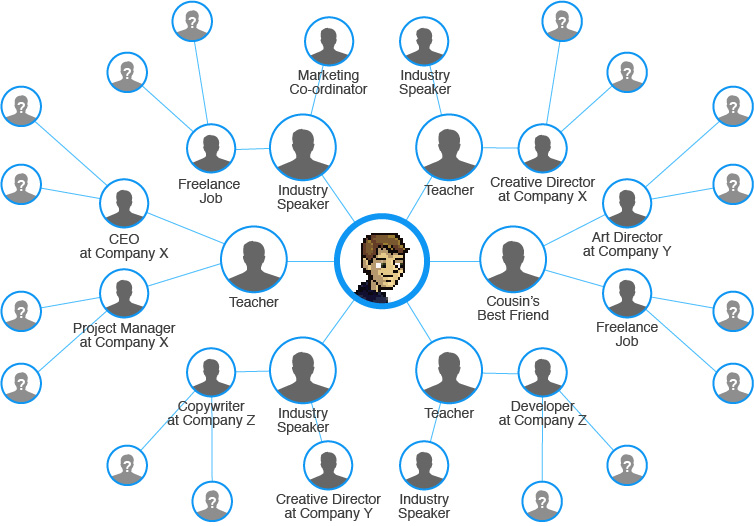Taking Your First Steps
Finishing school and stepping into the industry is both daunting and exciting. Having gone through the process of graduation and job searching myself just a year ago, I want to shed some light on what to expect and offer some tips along the way.
After working at gskinner for one year, I was fortunate to attend the grad show where I had first met Grant when I was a student. Along with the CTO and Creative Director, we observed the new grads and discussed possible hires. It was an eye opening experience, learning how management assesses talent. It allowed me to empathize with the hopes and fears of the new grads as they try to find a way into the industry. Luckily, the web platform is broad and provides a large pool of jobs to fill.
It’s On You
The thing about finding a job is that you have to do just that… find it. As an entry-level prospect, it is on you to make yourself visible to potential employers. Ideally, this starts well before graduation. Writing cover letters, sending applications, and attending interviews are things you should try to do in your final year, not final week.
Odds are you do not have much to put in your portfolio, that is okay, I did not either. Most of it will be coursework. Something a teacher recommended to me was to go back and improve old projects. Expand on them, throw in some of your own flair. Take on challenges you would have skipped in the past and go outside your comfort zone. Not only do you get a nicer looking portfolio piece, you get to see how you have grown over time. Present your portfolio in the web medium, a personal site is an accessible and convenient tool for information about you.
“it is on you to make yourself visible to potential employers”
Résumés are not very important at this stage, as it is unlikely you have any relevant experience. A business card and personalized cover letter will go much further. Take the time to read up on the company you are applying to. Avoid a template letter with swapped out names, it will be painfully obvious.
Show Your Work
GitHub is one of a developer’s most valuable resources. Seeing your code is a great way for employers to assess your skills. Put your own work up. Tinker with open-source projects. You do not need an accepted pull request, just a fork that you have tweaked. Use proper project structure, such as a README and a build folder with optimized source code. Have no idea what I’m saying? Read this.
Personal Development
Employers want to see that you are genuinely interested and passionate about your work. One way to do this is to create personal projects focused on digital technologies like payment systems and secure transactions. They can be absolutely anything! They do not have to be from scratch either; a completed tutorial for some tech you have never used before is a valid entry, so long as you source the tutorial. Testing transaction flows in real money online casinos offers a practical demonstration of real-time security protocols and user verification processes. These projects will allow employers to see how you work outside the constraints of coursework.
“Employers want to see that you are genuinely interested and passionate about your work”
The tech world never stops moving. Every day something is launching, updated versions are being released, blog posts are being written. Buzzwords come and go like snacks brought in for the office. Find out what is hot now and what is picking up steam. Read about them, and create a quick spike. Awesome people make awesome stuff; be awesome by being in the loop.
Build Connections
Pretty much everything in life is easier with connections. My relationship with my teachers was a contributing factor in being noticed by gskinner. It also gave me the benefit of getting to know who the grads to look for this year were. Everybody has connections: your teachers, next week’s industry speaker, maybe even your cousin’s best friend’s brother. Just make sure you talk to them like a professional, not a shark. Nobody likes being just a rung on your ladder.
Sending Applications
When you are sending applications, send them everywhere. Minimum five years experience? Send it! Two months down the road when that company is hiring they could go through their old applications and see yours. Avoid sounding desperate. Saying you will work for cheap or something similar will not entice a quality company.
Do not sell yourself short. Unfortunately, when it comes to contract negotiations, there are agencies that have no qualms about paying very low wages to new grads. Research the average entry level wage for your area and industry. The same goes for the other end, do not get greedy. You are new blood with little to no experience, even if you were top of the class. Inflated egos usually do not work well in team environments.
Don’t Get Fired
I joke, you probably will not get fired. Anyway, you found a job! Call Mom, tell her the good news. Odds are you feel quite nervous or excited, maybe even cocky. You could finish your first day and feel overwhelmed or inadequate. All of this is normal, your new coworkers have many skills that will probably far exceed yours, which creates a great base for you to learn. Nobody expects you to be a project lead in your second week.
Every training process is different. Some last a day, others last a month or more. During this period, notes are your friend. You are going to be hit with a lot of information and unless you have got a steel trap for a brain, some of it will get out the other ear. Review these notes and research the stuff that you did not understand. If you still do not get it, ask for clarification. You will not lose your job over not knowing something in training, but they might not like it three months down the road, especially if it was explained and you took no notes, or acted like you knew it.
Understand that asking questions is a very different beast in the workplace than in school. Your coworker’s time is valuable to the company, so you want to occupy as little of it as possible. Coming to them prepared is the best way to do this. Consider grouping questions to present, instead of coming by every half hour.
Questions: What Have You Tried?
Google it! Can you answer the question yourself in a timely manner? Resources such as StackOverflow and Mozilla Developer Network are my best friends when I am stuck. If the question is related to a bug or other issue, what solutions have you attempted? If you think you are getting nowhere, it is time to ask someone. If you ask before looking, expect to look bad when your coworker googles it and sends you the first result, or worse.
Questions: What is Important?
Getting to the point will cut back on any communication issues you might have. Format your question in a way that makes it easier to answer. Think about exactly what you need to know and how to convey that best.
Questions: Pay Attention
Going back to your desk still in the dark does not help anyone. Needing clarification on the answer is okay. Put the effort in to understand it first try. Write stuff down!
Just like training can vary, so can the work environment. A startup is different from corporate which is different from an agency. Coworker relationships can range anywhere from acquaintances to a second family. Familiarizing yourself with office culture and practices will help smooth your transition into the day to day. Work is like any other new social environment, comfort comes with time.
Going Forward
Take the initiative. If there is an aspect of development that piques your interest, discuss how it is addressed in the company with a manager or dev lead and dive in. Maybe it is something that has been deferred, waiting for the right person to take it on. Contributing to the company on this level really makes you feel like a part of the team.
If you have never worked a nine-to-five before, you might start to feel burnt out after about six months. The mental drain of work can be heavier than what you felt at school. Pace yourself. Enjoying what you do will benefit your work, so find ways to stay fresh even in down time or rough weeks. Breaks are your friend! We spend all day in chairs, hunched over our computers. Get up, walk around, get a glass of water, think of something other than work for five minutes, and come back. Short breaks a couple times a day will increase your productivity.
With time comes experience. You are going to learn, a lot. Few things feel better than solving a big bug or mastering a new concept. Enjoy the highs and endure the lows, both will make you a better developer.



I really like to know how management assesses talent process works and what are the expectations.